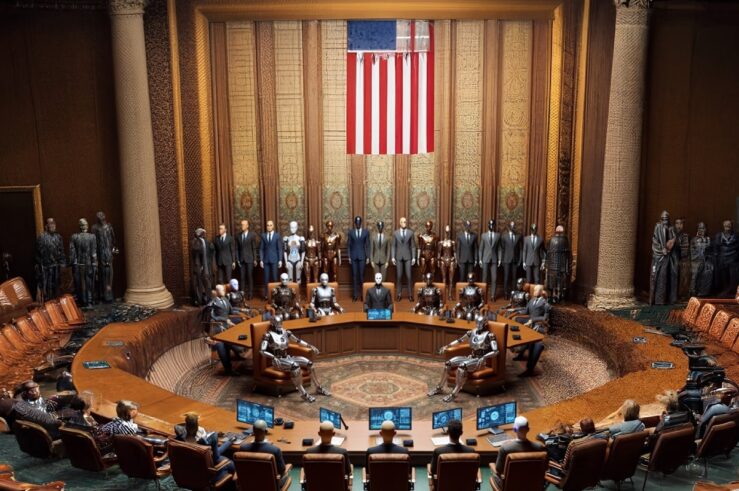In a front-page article entitled Congress Staffers Gain from Trading in Stocks, the Wall Street Journal reports that “72 aides on both sides of the aisle traded shares of companies that their bosses help oversee.” That finding was based on an “analysis of more than 3,000 disclosure forms covering trading activity by Capitol Hill staffers for 2008 and 2009.”
A number of the trades appear awfully suspicious. One aide to a member of the Senate Banking Committee, for example, bought Bank of America stock in mid- and late-April 2009, about the time BOA was conferring with the government over the results of Treasury’s “stress tests.” Those results were publicly disseminated on May 7, and the staffer eventually netted a 43% gain. The husband of a Pelosi aide bought around $4,700 of Fannie and Freddie stock and resold it later the same day — two days before the Fed authorized emergency funding to the two firms — for a $2,000 (43%) gain.
This could all be coincidental, of course. According to the Journal, “[t]he aides identified … say they didn’t profit by making trades based on any information gathered in the halls of Congress.” The Journal then goes on to say that “[e]ven if they had done so, it would be legal, because insider-trading laws don’t apply to Congress.”
I’m not sure about that last bit. The Journal doesn’t spell out why the aides’ trades wouldn’t run afoul of the federal insider trading prohibition, but I think it’s assuming that because members of Congress may trade on material, non-public information they learn in the course of their jobs, their aides may do so as well. I don’t think that’s right.
The securities laws treat insider trading (incorrectly, in my opinion) as a species of fraud. The statutory basis for the insider trading prohibition is Section 10(b) of the Exchange Act and Rule 10b-5 thereunder. Taken together, those provisions prohibit material misrepresentations and omissions in connection with the sale or purchase of a security. Because trading on the basis of material, non-public information usually doesn’t involve an affirmative misstatement, insider trading liability generally requires that the trader possess some duty to speak. Failure to speak in the face of a duty to do so then constitutes an actionable omission.
The Supreme Court has recognized two situations in which a duty to speak before trading may arise. First, if the trader is a fiduciary of her trading partner (as when an insider is buying her own company’s shares), the fiduciary relationship gives rise to a duty to speak to that partner (i.e., to disclose the material, non-public information) before trading. That’s the so-called “Classical” theory of insider trading. Even where the trader is not dealing in her own company’s securities, though, she may have a duty to speak before trading if she is in a relationship of trust or confidence with the source of her material, non-public information. Thus, under the so-called “Misappropriation” theory, a trader who received the non-public information at issue from someone to whom she owes a duty of trust or confidence “feigns fidelity to the source” of that information (those are the Supreme Court’s words) if she trades without first notifying her source of her intention to do so. That’s an actionable omission that may run afoul of Rule 10b-5 and Section 10(b).
Given these rules, one can see why members of Congress would have lots of leeway to engage in insider trading. If the member is not an insider of the company whose stock she’s trading (which will almost always be the case), the Classical theory will not apply. Because members of Congress generally don’t owe duties of trust or confidence to the many sources from which they receive material non-public information, they would not be “feigning fidelity to the source” of such information in trading on it without first declaring their intent to do so, and the Misappropriation theory would not apply. Thus, the current regulatory scheme leaves a hole that members of Congress could presumably exploit. While the Stop Trading on Congressional Knowledge (“STOCK”) Act would fill those gaps, it has very few sponsors and isn’t likely to be enacted anytime soon.
But to say that current insider trading rules generally don’t reach trades by members of Congress is not to imply that congressional staffers are free to trade on material non-public information they acquire in the course of their jobs. I’ve never worked for a member of Congress, but I assume that staffers agree to keep confidential any material information about legislative developments that might affect the prospects of listed companies. If a staffer does make such a pledge, either explicitly or implicitly, then isn’t trading on the information “feigning fidelity to the source of the information” — i.e., the congressman for whom she works?
Am I missing something? I confess that I know nothing about how legislators’ offices work. If I’ve omitted something from the analysis, please enlighten.
UPDATE: More from Professor Bainbridge here and here. (Didn’t see his posts before drafting mine.) I learned much of what I know about insider trading from Professor B’s fine work on the subject, so, not surprisingly, we’re making the same basic points in these posts.




